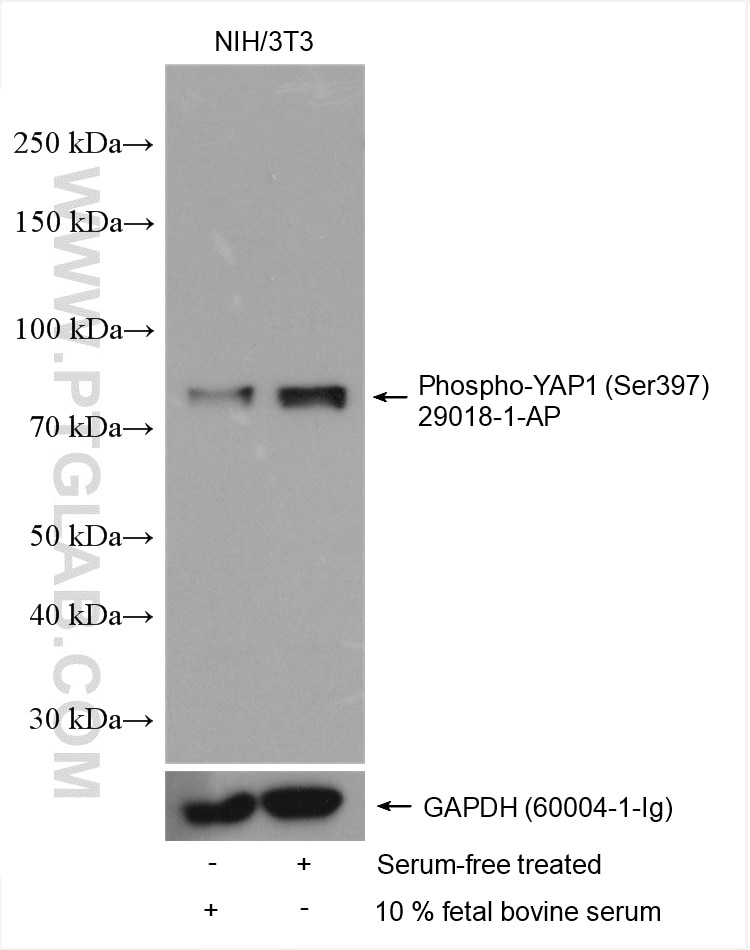Tested Applications
| Positive WB detected in | Serum-free treated NIH/3T3 cells, 10 % fetal bovine serum treated NIH/3T3 cells |
Recommended dilution
| Application | Dilution |
|---|---|
| Western Blot (WB) | WB : 1:2000-1:16000 |
| It is recommended that this reagent should be titrated in each testing system to obtain optimal results. | |
| Sample-dependent, Check data in validation data gallery. | |
Published Applications
| WB | See 24 publications below |
| IHC | See 2 publications below |
| IF | See 1 publications below |
Product Information
29018-1-AP targets Phospho-YAP1 (Ser397) in WB, IHC, IF, ELISA applications and shows reactivity with human, mouse samples.
| Tested Reactivity | human, mouse |
| Cited Reactivity | human, mouse, rat |
| Host / Isotype | Rabbit / IgG |
| Class | Polyclonal |
| Type | Antibody |
| Immunogen | Peptide Predict reactive species |
| Full Name | Yes-associated protein 1, 65kDa |
| Calculated Molecular Weight | 504 aa, 54 kDa |
| Observed Molecular Weight | 75 kDa |
| GenBank Accession Number | BC038235 |
| Gene Symbol | YAP1 |
| Gene ID (NCBI) | 10413 |
| RRID | AB_2923587 |
| Conjugate | Unconjugated |
| Form | Liquid |
| Purification Method | Antigen affinity purification |
| UNIPROT ID | P46937 |
| Storage Buffer | PBS with 0.02% sodium azide and 50% glycerol, pH 7.3. |
| Storage Conditions | Store at -20°C. Stable for one year after shipment. Aliquoting is unnecessary for -20oC storage. 20ul sizes contain 0.1% BSA. |
Background Information
The transcriptional factors Yes-associated protein 1 (YAP1) and PDZ-binding motif (TAZ) act as downstream effectors of the Hippo pathway, and their subcellular location and transcriptional activities are affected by multiple post-translational modifications (PTMs). After phosphorylation, YAP1/TAZ binds to the 14-3-3 protein, which induces cytoplasmic retention of YAP1/TAZ. Moreover, phosphorylated YAP1/TAZ is likely to undergo ubiquitination degradation that is dependent on the β-transducin repeat-containing E3 ubiquitin protein ligase complex. The phosphorylation of YAP at Ser127 promotes its cytoplasmic retention, whereas phosphorylation at Ser397 induces degradation. (PMID: 29682330, PMID: 26039999)
Protocols
| Product Specific Protocols | |
|---|---|
| WB protocol for Phospho-YAP1 (Ser397) antibody 29018-1-AP | Download protocol |
| Standard Protocols | |
|---|---|
| Click here to view our Standard Protocols |
Publications
| Species | Application | Title |
|---|---|---|
Front Immunol The role of YAP1 in survival prediction, immune modulation, and drug response: A pan-cancer perspective | ||
Int Immunopharmacol ASIC1a regulates ferroptosis in hepatic stellate cells via the Hippo/Yap-1 pathway in liver fibrosis | ||
Int Immunopharmacol Ischemia-inhibited ferric chelate reductase 1 improves ferroptosis-mediated intestinal ischemia injury via Hippo signaling | ||
Sci Rep Gingival proteomics reveals the role of TGF beta and YAP/TAZ signaling in Raine syndrome fibrosis | ||
Mol Cell Biochem RNF144A-AS1 stabilizes TAF15 and promotes malignant biological behaviors of skin cutaneous melanoma |
Reviews
The reviews below have been submitted by verified Proteintech customers who received an incentive for providing their feedback.
FH Udesh (Verified Customer) (08-19-2024) | Worked well to detect pYAP at 70 kDa
 |



